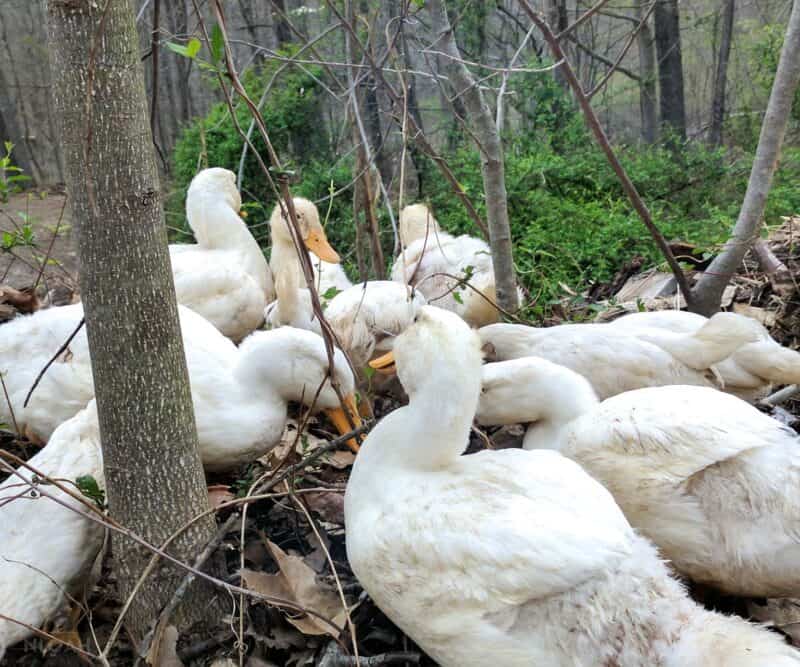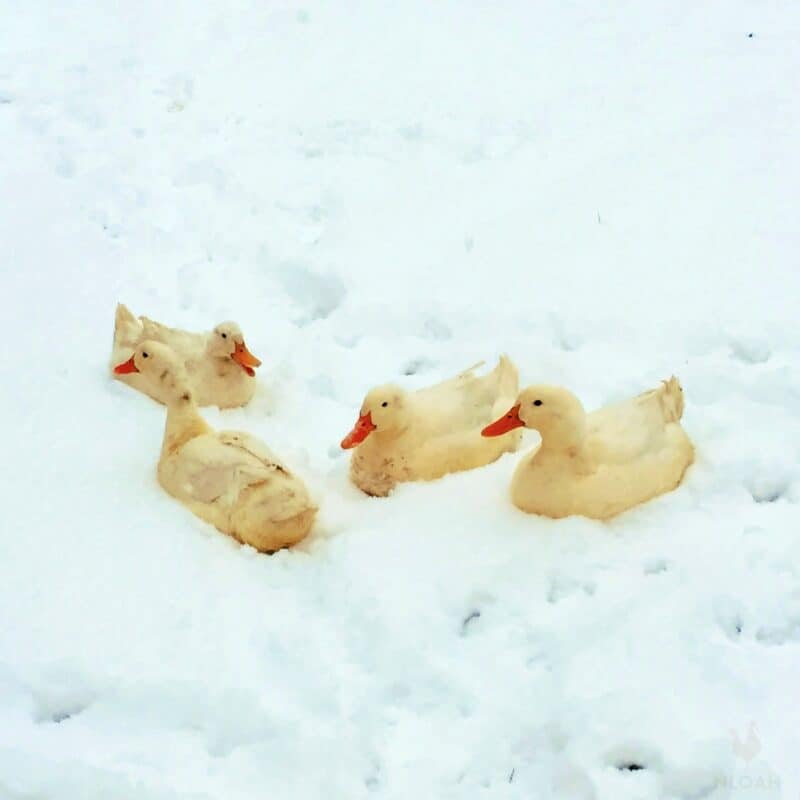Pekin ducks are the single most popular domestic breed kept in the United States, raised for both the ample amounts of meat that they can supply and also they are excellent egg production. Still, as beloved as the breed is, they seem to have a reputation for being short-lived.

Some owners say that they only get a few years of life out of their precious Pekins. Others say they live a long and healthy life. What’s the real story? What is the lifespan of a Pekin duck?
American Pickens live on average between 8 and 12 years, though they can live longer with good nutrition and good health support.
That’s the official answer, and in my experience also the correct one. Pekins aren’t particularly long-lived in terms of domestic breeds, but neither are they mayflies that will live only a few years.
Nonetheless, we’ve got a lot of anecdotal evidence to consider also, and we’d better get to it. Keep reading, and I’ll take you through further investigations on the lifespan of Pekins.
What is the Average Lifespan for a Domestic Duck?
Most domestic ducks have an average lifespan of between 8 and 12 years. There are some exceptional differences, like widgets for instance which can live for upwards of 20 years regularly, or Mallards which tend to only reach 8 at the most, but that’s a reliable benchmark.
Of course, many variables that influence that average, including lineage, genetic factors, environment, nutrition, etc. And, simply, individual ducks sometimes just die young or live to a ripe old age.
Pekins as a Breed Have an Average Lifespan
So, no one with the average lifespan is for all domestic breeds we can see that Pekins do, in fact, live to a pretty ripe old age most of the time.
I think that’s part of the problem in a way: Pekin owners might assume that their precious ducks will live for 10, 12, 15, or even more years and be considered elderly. But if they then grow ill and pass away at “just” 8 or 9 years old, their owners might split the difference and say that Pekins just don’t live that long.
Likewise, compared to some of the longest-lived breeds like the one I mentioned above, even a truly ancient Pekin at 11 or 12 years old might not feel like it has lived quite so long.
This is a perception issue, but truly not a practical one concerning the longevity and lifespan of Pekins as a breed.

American Pekins Live a Little Longer than German Pekins
One important note is that not all Pekins are created equal. There are American Pekins, the ones that you are almost certainly familiar with, and German Pekins.
These two breeds look very, very similar but they’re not identical, and they have many basic characteristics that are quite different. Of the two, American Pekins live significantly longer on average compared to their German cousins.
But, you should also know that German Pekins are quite rare, especially in the United States, and that is why you will invariably see Pekins advertised as simply Pekins– there’s no need to make the distinction unless you are dealing with a specialized hatchery or breeder.
German Pekins May Only Live Around 5 Years!
Regrettably, the German Pekin has an average lifespan that’s significantly shorter, most of the time, compared to the American breed.
German Pekins will only live on average about 7 or 8 years at the most, with exceptional birds making it to 10 years. These are the Pekins that will regularly die at just 5 or 6 years of age!
This is just inherent to the breed, unfortunately, and there’s nothing to be done about it. Keep that in mind if you want to add some German pecans to your flock.
Many Report that Their Pekins Don’t Live Very Long
Now, statistics and official characteristics are all fine and good, but why is it that seemingly so many peaking owners report that their birds just don’t live that long?
I’m not saying these people are liars, not at all: I myself have owned a few ducks that died suddenly and young, even when they were seemingly in the best of health. I know I was definitely doing my part to keep them healthy, anyway.
I think this is a case of artificially inflated statistics, basically a type of instance that’s more visible partly because Pekins are so popular, and with so many in private hands when they do die young people go online to talk about it.
For the rest of us, this naturally gives rise to the notion that Pekins are dropping dead at an early age everywhere, when in actuality these are fringe cases, statistically, that are just made more visible by the sheer number of birds out there.
My heart goes out to these poor folks who lost their Pekins young, though!
Pekins Tend to Have Robust Immune Systems, but Suffer Due to Their Size and Weight
There’s also a rumor going around that Pekins tend to be sickly and prone to diseases, and that contributes to a greatly reduced lifespan. In my experience, which is considerable, the opposite is the case…
Pekins tend to be remarkably happy, healthy, and hardy, and rarely get sick as long as they’re given even a little bit of care and adequate shelter. Their immune systems tend to take care of most minor infections with hardly any concerns and it’s rare to see them acting depressed or ill for any length of time.
However, Pekins are large ducks. Very large ducks! Drakes can tip the scales at more than 10 pounds.
Like most larger poultry they are unfortunately prone to suffering certain other injuries because of their size and weight, namely bumblefoot, injuries to the nails and webs of their feet, and accidents if they hop or drop from an elevated place. They don’t fly well, remember?
It is possible that these injuries and, sometimes, subsequent infection could certainly have a major and negative effect on the health of pecans and might contribute to a reduced lifespan, though this is not necessarily endemic to the entire breed.
Nutritional Deficiency is Likely the Cause of Reduced Lifespans
If I were going to bet on one factor significantly reducing the lifespan of a Pekin, it would be nutritional deficiency, either calories, vitamins or minerals, or all three.
As mentioned, Pekins are a very large breed and that means they have correspondingly higher nutritional requirements in order to stay healthy, grow and thrive, particularly when they’re going through the molt or laying eggs. They’ll also need a lot more nutrition and calories in the wintertime to help them stay warm.
I suspect that some well-meaning but ignorant or careless owners simply might not be getting these big birds the food that they need in order to thrive, and Pekins, like most ducks, tend to be quite stoic and so they wouldn’t necessarily know that their birds were ailing until it was too late.
Tom has lived and worked on farms and homesteads from the Carolinas to Kentucky and beyond. He is passionate about helping people prepare for tough times by embracing lifestyles of self-sufficiency.
